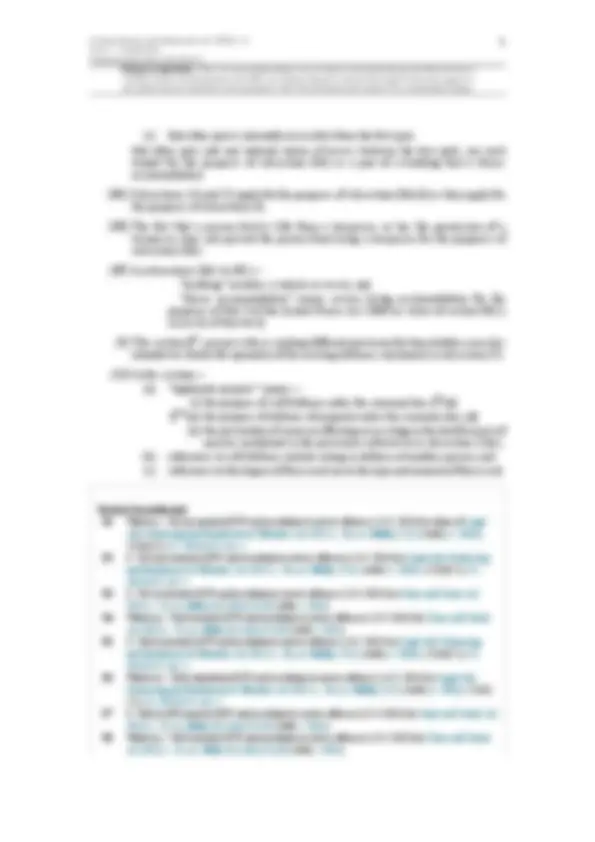





Study with the several resources on Docsity

Earn points by helping other students or get them with a premium plan


Prepare for your exams
Study with the several resources on Docsity

Earn points to download
Earn points by helping other students or get them with a premium plan
Community
Ask the community for help and clear up your study doubts
Discover the best universities in your country according to Docsity users
Free resources
Download our free guides on studying techniques, anxiety management strategies, and thesis advice from Docsity tutors
The self-defence and reasonable force provisions under the Criminal Justice and Immigration Act 2008. It explains the defences available to a person charged with an offence, including the common law defence of self-defence, defence of property, and the defences provided by the Criminal Law Act 1967. The document also discusses the factors considered when determining the reasonableness of the degree of force used in self-defence, and the application of these provisions in householder cases.
Typology: Study notes
1 / 5

This page cannot be seen from the preview
Don't miss anything!




Changes to legislation: There are outstanding changes not yet made by the legislation.gov.uk editorial team to Criminal Justice and Immigration Act 2008. Any changes that have already been made by the team appear in the content and are referenced with annotations. (See end of Document for details) View outstanding changes
Self-defence etc. 76 Reasonable force for purposes of self-defence etc. (1) This section applies where in proceedings for an offence— (a) an issue arises as to whether a person charged with the offence (“D”) is entitled to rely on a defence within subsection (2), and (b) the question arises whether the degree of force used by D against a person (“V”) was reasonable in the circumstances. (2) The defences are— (a) the common law defence of self-defence; [F1 and ] [F2 (aa) the common law defence of defence of property; and ] (b) the defences provided by section 3(1) of the Criminal Law Act 1967 (c. 58) or section 3(1) of the Criminal Law Act (Northern Ireland) 1967 (c. 18 (N.I.)) (use of force in prevention of crime or making arrest). (3) The question whether the degree of force used by D was reasonable in the circumstances is to be decided by reference to the circumstances as D believed them to be, and subsections (4) to (8) also apply in connection with deciding that question. (4) If D claims to have held a particular belief as regards the existence of any circumstances— (a) the reasonableness or otherwise of that belief is relevant to the question whether D genuinely held it; but
Part 5 – Criminal law Document Generated: 2022-06- Changes to legislation: There are outstanding changes not yet made by the legislation.gov.uk editorial team to Criminal Justice and Immigration Act 2008. Any changes that have already been made by the team appear in the content and are referenced with annotations. (See end of Document for details) View outstanding changes (b) if it is determined that D did genuinely hold it, D is entitled to rely on it for the purposes of subsection (3), whether or not— (i) it was mistaken, or (ii) (if it was mistaken) the mistake was a reasonable one to have made. (5) But subsection (4)(b) does not enable D to rely on any mistaken belief attributable to intoxication that was voluntarily induced. [F3 (5A) In a householder case, the degree of force used by D is not to be regarded as having been reasonable in the circumstances as D believed them to be if it was grossly disproportionate in those circumstances. ] (6) [F4 In a case other than a householder case, ] the degree of force used by D is not to be regarded as having been reasonable in the circumstances as D believed them to be if it was disproportionate in those circumstances. [F5 (6A) In deciding the question mentioned in subsection (3), a possibility that D could have retreated is to be considered (so far as relevant) as a factor to be taken into account, rather than as giving rise to a duty to retreat. ] (7) In deciding the question mentioned in subsection (3) the following considerations are to be taken into account (so far as relevant in the circumstances of the case)— (a) that a person acting for a legitimate purpose may not be able to weigh to a nicety the exact measure of any necessary action; and (b) that evidence of a person's having only done what the person honestly and instinctively thought was necessary for a legitimate purpose constitutes strong evidence that only reasonable action was taken by that person for that purpose. (8) [F6 Subsections (6A) and (7) are ] not to be read as preventing other matters from being taken into account where they are relevant to deciding the question mentioned in subsection (3). [F7 (8A) For the purposes of this section “a householder case” is a case where— (a) the defence concerned is the common law defence of self-defence, (b) the force concerned is force used by D while in or partly in a building, or part of a building, that is a dwelling or is forces accommodation (or is both), (c) D is not a trespasser at the time the force is used, and (d) at that time D believed V to be in, or entering, the building or part as a trespasser. (8B) Where— (a) a part of a building is a dwelling where D dwells, (b) another part of the building is a place of work for D or another person who dwells in the first part, and (c) that other part is internally accessible from the first part, that other part, and any internal means of access between the two parts, are each treated for the purposes of subsection (8A) as a part of a building that is a dwelling. (8C) Where— (a) a part of a building is forces accommodation that is living or sleeping accommodation for D, (b) another part of the building is a place of work for D or another person for whom the first part is living or sleeping accommodation, and
Part 5 – Criminal law Document Generated: 2022-06- Changes to legislation: There are outstanding changes not yet made by the legislation.gov.uk editorial team to Criminal Justice and Immigration Act 2008. Any changes that have already been made by the team appear in the content and are referenced with annotations. (See end of Document for details) View outstanding changes F9 Word in s. 76(10)(a) omitted (E.W. and in relation to service offences) (14.5.2013) by virtue of Legal Aid, Sentencing and Punishment of Offenders Act 2012 (c. 10), ss. 148(5) , 151(1) (with ss. 148(6), 152(6)(7)); S.I. 2013/1127, art. 2 F10 S. 76(10)(a)(ia) inserted (E.W. and in relation to service offences) (14.5.2013) by Legal Aid, Sentencing and Punishment of Offenders Act 2012 (c. 10), ss. 148(5) , 151(1) (with ss. 148(6), 152(6) (7)); S.I. 2013/1127, art. 2 Modifications etc. (not altering text) C1 S. 76(8B)-(8F) applied (with modifications) by Dangerous Dogs Act 1991 (c. 65), s. 3(1B) (as inserted (E.W.) (13.5.2014) by Anti-social Behaviour, Crime and Policing Act 2014 (c. 12), ss. 106(2)(b) , 185(1); S.I. 2014/949, art. 3, Sch. para. 6) Commencement Information I1 S. 76 in force at 14.7.2008 by S.I. 2008/1586, art. 2(1), Sch. 1 para. 36
Document Generated: 2022-06- 5 Changes to legislation: There are outstanding changes not yet made by the legislation.gov.uk editorial team to Criminal Justice and Immigration Act 2008. Any changes that have already been made by the team appear in the content and are referenced with annotations. View outstanding changes Changes and effects yet to be applied to the whole Act associated Parts and Chapters: Whole provisions yet to be inserted into this Act (including any effects on those provisions):